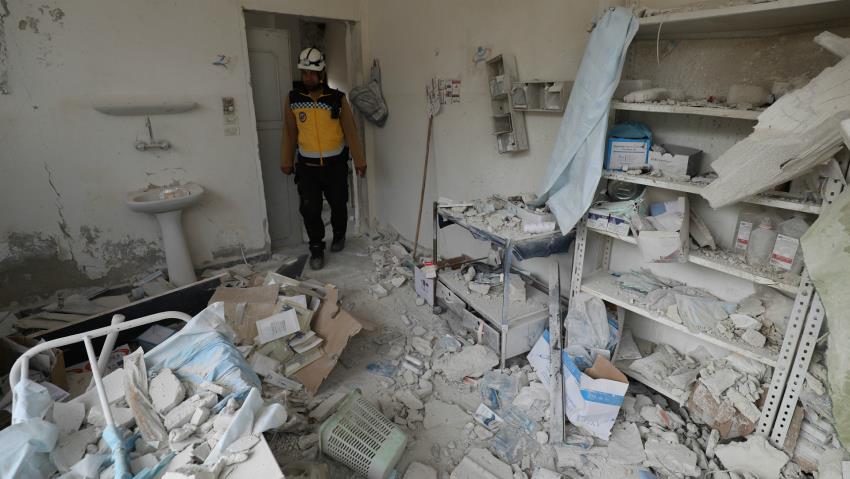As Syria marks nearly 10 years since the beginning of its bloody conflict, a new report shows the widespread and devastating impact a decade of fighting has had on health care facilities, health workers and on civilians.
The report, published on Wednesday by the International Rescue Committee (IRC) and a number of its Syrian partner organisations, highlights the ways in which the war has turned hospitals from places of shelter to danger zones until this day.
Chilling testimonies from more than 300 people – including 74 health workers – in 13 sub-districts of the Aleppo and Idlib governorates give a deeper insight into what life is like for Syrians living under conflict.
The war, now widely seen as a proxy conflict, began shortly after Syrians in 2011 joined a wave of anti-government Arab Spring uprisings taking place across the region.
In response, authorities launched a brutal crackdown on dissent. Millions fled the country, and hundreds of thousands have since been killed.
Hospitals and clinics have been targeted and destroyed in cities across the country amid fighting between government forces – backed by Russia and Iran – and armed rebels.
Almost 60 percent of the civilians interviewed for the report had been directly impacted by an attack on a healthcare facility, service or worker over the past 10 years, the IRC said.
This deliberate targeting of healthcare has left many health workers fearing for their lives and for their families. According to the report, an estimated 70 percent of the health workforce has left the country, leaving just one Syrian doctor for every 10,000 civilians.
With an acute shortage of medical facilities and resources, many medics reported working at least 80 hours a week in a bid to compensate, the report said, adding that remaining medical practitioners often perform their work amid violence and without adequate equipment.
“A country that once domestically produced 90 percent of required medicines now faces catastrophic shortages,” the report found.
Physicians for Human Rights have documented 595 attacks on healthcare in Syria since 2011, and the IRC said it has documented at least 24 attacks on its own programmes in northwest Syria in just the past two years alone.
Misty Buswell, the communications director for the IRC, told Al Jazeera that Syria’s health sector has been “decimated”.
“We know in northwest Syria, for example, the UN has said that 50 percent of health facilities are no longer functioning,” she said.
Al Jazeera’s Zeina Khodr, reporting from Beirut, said hospitals have been repeatedly bombed by Syrian government forces and Russia “in what has been described as a systematic campaign to force the opposition to surrender”.
Hospitals razed
Government-led offensives have pushed back what remained of opposition groups, they are now confined to Idlib province – an overcrowded enclave in the country’s northwestern region,
Idlib, which was dubbed a “dumping ground” for evacuees who fled government offensives in other parts of the country, is now facing a raging coronavirus pandemic while much of its healthcare facilities are in ruins.
A doctor interviewed for the report who works in a hospital in Idlib for the Syrian American Medical Society (SAMS) said he has been displaced from his home 25 times since the start of the conflict. Kamel* works between 60 and 84 hours a week.
“One of the biggest challenges we face is working in a medical facility that might be targeted at any time by airstrikes … I have witnessed several attacks, whether on health centres or hospitals, in several areas and I was inside these facilities at the time,” he said.
Similarly, Sayed*, another doctor in Idlib, witnessed several attacks. One hospital he worked at was razed to the ground by air raids.
“It was a catastrophe,” Sayed said. “There was no time for us to do anything to prepare or evacuate … We were all underneath the rubble.”
The attack killed five staff members and three patients, he said.
“Among the most difficult moments also are when children and pregnant women are among the war casualties,” Sayed said.
“When a patient passes away, it is a terrible feeling. Especially when the family comes later or the mother, crying and wailing for the child they lost. These are very bad moments. All of them. We have lived through a lot of moments like this.”
Other doctors, like Nabeel*, noted that the “worst moments” are those following the shelling, when warplanes drop “barrels and vacuum bombs on a residential area”.
Every building tends to house approximately 20 families, Nabeel said, meaning a “huge number” of injured people are usually rushed to the hospital at the same time – setting off a desperate scramble for supplies and staff.
And he said there “is always the fear that the facility you are in will be targeted. There is a joke that says the armed opposition groups don’t build their bases near hospitals because they know that hospitals will be targeted”.
‘Crippled’ health care system
The accumulated effect of years of attacks on health infrastructure has devastated services. The report found that the attacks left the country’s health system struggling to meet the “rising needs of 12 million people in need of health assistance”.
A lack of medicines and much-needed supplies has also exacerbated the situation.
Healthcare in Syria has been “further crippled by the repeated removal of medical supplies from aid convoys” by parties involved in the conflict, the report said, as well as the long-term closure of three of the four UN-mandated border crossings from neighbouring Jordan, Iraq and Turkey.
“There are hundreds of patients with chronic conditions – heart disease, diabetes, asthma, high blood pressure, cancer – who need periodic visits to the health centres,” Gaith*, a nurse at an IRC clinic in Idlib, said,
“After these attacks, many centres were forced to close or to move to a safer area, which affected patients negatively.”
The events of the last 10 years have affected people’s mental and psychological health. According to the report, two-thirds of survey respondents indicated that their wellbeing has been negatively impacted by attacks on health facilities.
Many, including pregnant women, were too afraid to access healthcare facilities.
“My house was bombed while I was pregnant,” Layla* from Atareb in Aleppo, said.
“I suffered from severe bleeding and lost my first child. I was unable to go to the clinic because I was afraid of the bombing,” she said.
Al Jazeera’s Zeina Khodr said that a ceasefire in Syria appears to be largely holding.
“But it hasn’t eased the humanitarian crisis. The violence has caused critical damage to Syrians health sector, affecting the ability of millions to receive proper healthcare,” she said.
In its recommendations, the IRC urged the international community to reaffirm the importance of adhering to international humanitarian law and to intensify diplomatic efforts to end the violence.
It also called for increased humanitarian aid and access, especially amid the COVID-19 pandemic.
“Protecting and expanding access to health and humanitarian services should be prioritised to ensure that Syrians achieve the right to health and wellbeing,” it said.
Names marked with an asterisk* have been changed to protect identities.
(Al Jazeera)

